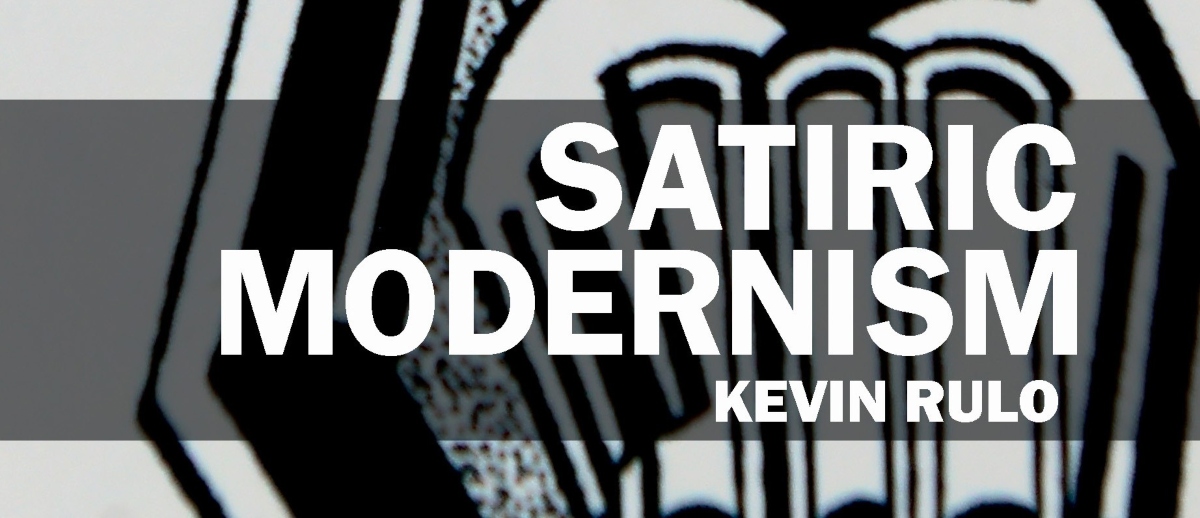A conversation with Dr. Kevin Rulo

by Dr. Gregory Baker
The COVID-19 pandemic has altered many of our conventional routines -- even the paths we take to study and learning. But the faculty in the English department remain eager to share their current research and ongoing scholarship with students and fellow colleagues. With that in mind, I recently sat down to interview my colleague and friend, Dr. Kevin Rulo. The emergence of a new book always marks an important moment for any professor, and this spring, Dr. Rulo is bringing out a scholarly monograph focused on the pervasive mood of Anglophone literature in the early twentieth century. He has entitled the book, Satiric Modernism.
For the wider university community, Kevin Rulo is known for wearing a number of important hats. As clinical assistant professor, he regularly teaches courses on modernism, satire, and the practice of writing for the English department. He also serves as both the director of our Writing and Rhetoric Program and the director of the university's Writing Center. In these roles, Dr. Rulo teaches and directly mentors our graduate fellows in English, fostering their growth as college instructors of writing and rhetoric. In the Writing Center, he further facilitates work with writers of all levels across the university, overseeing a team of skilled graduate and undergraduate tutors. These students, in turn, provide critical academic services to the wider student body of Catholic University. And yet, in addition to juggling all of this work, Dr. Rulo has also maintained an active research life in the field of literary modernism, and his new book, Satiric Modernism, marks the present culmination of his research. Below we discussed the substance and genesis of his new work.
What is your book about?
Satiric Modernism considers how authors and creators of the last hundred years made use of satire to explore their own modernity in ways that reflected anxieties and hesitations about their sense of self and place in a rapidly changing world. I examine poetry and prose, as well as some film and drama, particularly related to networks of experimental practice in the North Atlantic but also in postcolonial and global contexts. I show how satire is part of the DNA as it were of modernism, every bit as much as other familiar modernist aesthetic practices like stream of consciousness or fragmentation. I also follow this satiric practice as it moves about the globe in more recent times and is shaped by new contexts and by encounters with writers influenced by modernism.
Your work stresses the role of satire in modernism’s reflexive evaluation of modernity. Do you see satire’s importance as a corporate phenomenon -- one which helped a variety of writers develop inherently different expressive possibilities, or stylistic experiments? Is a kind of cultural anxiety the dominant mood of 'satiric modernism'?
In all of the literature that I study in the book there is a common mood or stance toward one’s “times,” one marked by this quality of ambivalence, or double-mindedness about modernity that is expressed aesthetically through satire. Having said that, the writers whom I discuss – early modernists like Eliot and Joyce but also Ralph Ellison and later authors like Sam Selvon – have markedly different styles and make use of satire in different tones and with different strategies befitting to their styles. These differences are also expressed in the way that these writers at times direct their satires at each other, so that satire becomes also a way for modernists to think about their art in relation to their contemporaries.
What would you say your book’s central contribution is to the field of modernist studies?

Though satire is a genre that cuts across periods and media, many would perhaps most often associate it with the Roman ‘imitations’ and the Augustan age -- as in the writings of Alexander Pope, John Dryden, Jonathan Swift and Samuel Johnson? Do you see links in the modernist deployment of satire with that age, or any other significant literary predecessors?
Just as the satire of modernism is multiple and pluralistic in its technique, so too is it in its relations to literary tradition. A writer like Eliot engages and creatively imitates Pope and Dryden, for example, and the literature of the Augustan age can equally be seen in the modernist reboot of “classicism.” At the same time, modernist satire draws amply from later writers like Byron and Baudelaire, to just name a few, so there is a way in which modernist satire, as in other areas, employs a variety of usable pasts to “make it new.”
Along these lines, modernism draws out just how unstable and complex satiric art can be. There is this fairly widespread belief that satire is a rather crude form, lacking in the ambiguity and nuance of other, more literary and artful expressions. Modernism’s satire explodes this myth by giving us a satire that is every bit as rich and layered in its meaning as other forms. We see this, just to give one example, in the way that the objects of critique in this satire cannot be reduced to simple “others” but often share aspects of biographical entanglement with the authors of the satire.
What motivated you to pursue the topic of satire?
I’ve always been interested in the power of satire to move us, sometimes to frustrate us or anger us but to move us just the same, to stir up important issues in our common lives and to help us to think through those issues collectively. I think we see that in much of the satire and irony that we encounter regularly today, whether it be on social media or in news satire or film. Satire has that same interest I would say for the writers I study. They are encountering new situations and new social experiences, new aesthetic values, and satire is a way for them to explore and process, to laugh at/with, to critique, the world that they live in.
Your book began as a dissertation. How would you characterize your experience of revising it for publication? Do you have any advice for those hoping to turn their academic research towards publication and a wider audience?
For me, the original project ended up being more of a distant cousin of the book. The dissertation was a great opportunity to think through many of the issues at stake, providing various starting points for further exploration. It made revision and expansion of the project possible amid many, inevitable constraints of time and attention. But I’m sure that the process of going from dissertation to book can be as varied as the kinds of writers and projects involved, and certainly can unfold with fewer zigs and zags. When it comes to writing, I’ve found that the best advice is often the most banal. There’s nothing earth-shattering about saying, “know your audience,” but if you have a really clear sense for who you want to share your research with and why, then I think a lot of the other pieces will inevitably fall into place.
